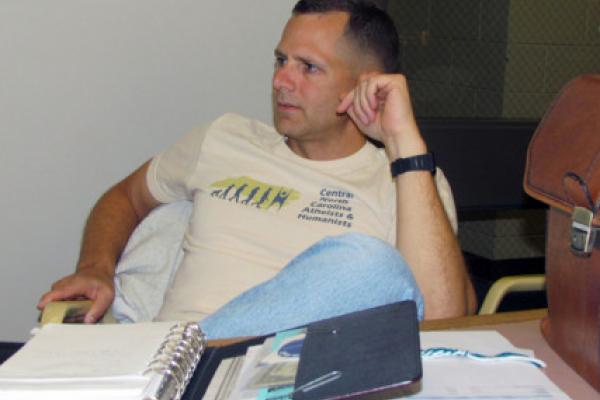More than two years after first making his request, Army Maj. Ray Bradley can now be known as exactly what he is: a humanist in the U.S. military.
Lt. Col. Sunset R. Belinsky, an Army spokeswoman, said Tuesday that the “preference code for humanist” became effective April 12 for all members of the Army.
In practical terms, the change means that humanists could face fewer hurdles in trying to organize within the ranks; military brass would have better information to aid in planning a deceased soldier’s funeral; and it could lay the groundwork for eventually adding humanist chaplains.
The change comes against a backdrop of persistent claims from atheists and other nonbelievers that the military is dominated by a Christian culture that is often hostile to unbelief. In recent years, activists from the broad spectrum of freethinking organizations have demanded equal treatment as the tradition-bound military grapples with the growth of the spiritual-but-not-religious population.
Jason Torpy, president of the Military Association of Atheists and Freethinkers, has been pushing for greater recognition of humanists in the armed services; in February, the American Civil Liberties Union sent a letter to the Pentagon on Bradley’s behalf.
“This is a big victory,” Torpy said, who noted the decision was by the Army and not the other military services. “This is one part, and the easiest part, of a very long list of other reforms that have to happen before we have equality, not just belief or no belief but theistic belief and nontheistic belief like ours.”
The ACLU wrote in its letter that members of nontheistic faiths should have the option of describing themselves, just as members of theistic faiths do.
“Given the wide range of religious-preference designations currently allowed by the armed forces, there is no reason to deny Humanism similar recognition,” ACLU lawyers wrote.
According to a survey by the Defense Equal Opportunity Management Institute, humanists make up 3.6 percent of the U.S. military.
Bradley, 47, said the ability to officially state “humanist” as a religious preference is technically an additional code in the military’s database.
Although he doesn’t believe in God, Bradley determined that the term “atheist” was not sufficient for him. Frustrated with the lengthy process in getting the “humanist” designation, he had switched to “atheist” in January 2013. But he said “humanist” explains his life stance, which stresses scientific explanations and maximizing human happiness.
He hopes to work now with Torpy to encourage other humanists in the military to officially identify themselves and to seek opportunities for them to meet in facilities and advertise their meetings as many religious groups do.
“It may be very difficult, especially for young soldiers, to take such a step,” he said, noting some would be wary that they might be discriminated against if they reveal they are humanists.
Chaplain (Col.) Kenneth Stice, director of operations for the Army’s Office of the Chief of Chaplains, said the religious preference information — though voluntary — helps the military know how best to respect the religious wishes of an injured or deceased soldier. He said the chaplain corps is beginning to grapple with those who are in the “spiritual but not religious” category and will learn from humanists how to address their particular needs for accommodation.
Bradley said a 2012 meeting at Fort Bragg featuring the president of the American Humanist Association required a “special request” because the group wasn’t officially recognized.
“Humanists have life events, just like any other human being,” such as weddings and naming ceremonies for babies, he said. “Accommodation for that type of events in life, I think, would be important for the chaplaincy to support.”
The religious preference designation could mean that humanist chaplains aren’t far behind.
Torpy’s organization and groups such as the Secular Coalition for America continue to seek humanist chaplains in the military. But Bradley said he sees a more gradual process: first the designation, then a layperson designated as a “distinctive faith group leader” and eventually a chaplain.
“The military doesn’t usually turn on a dime like that,” he said. “I would see it more as a progression of steps.”
Adelle M. Banks writes for Religion News Service. Via RNS.
Got something to say about what you're reading? We value your feedback!
